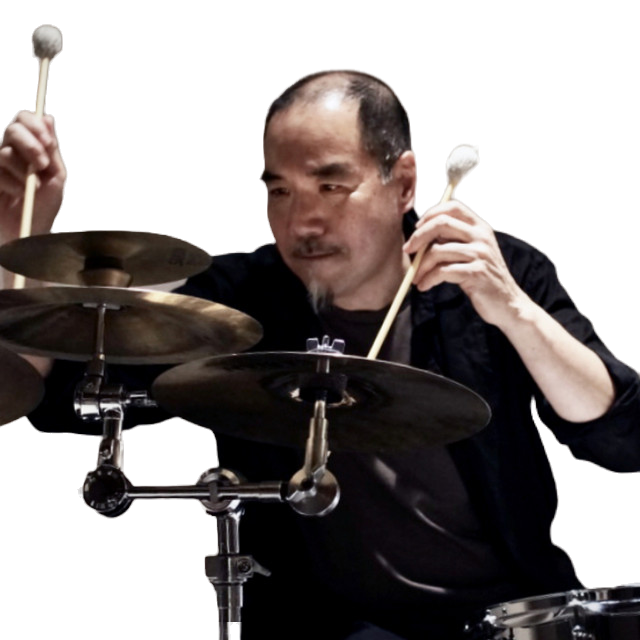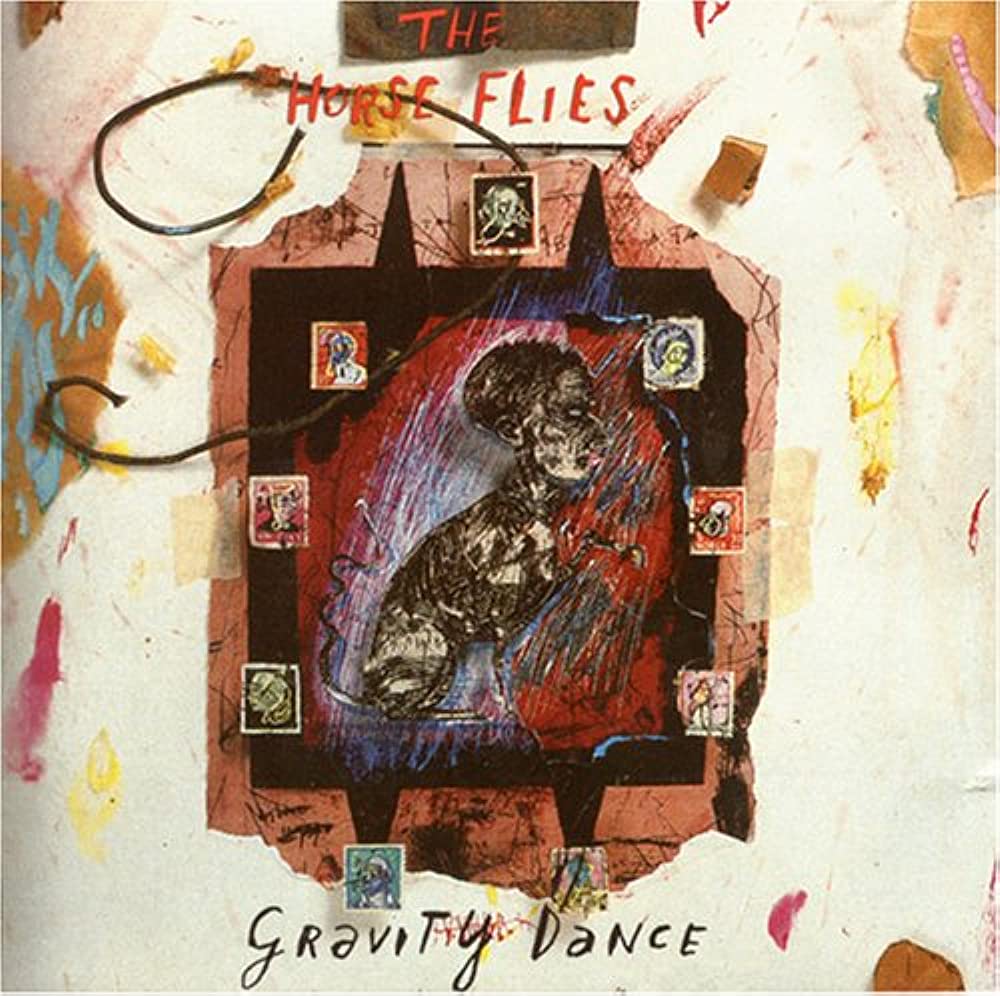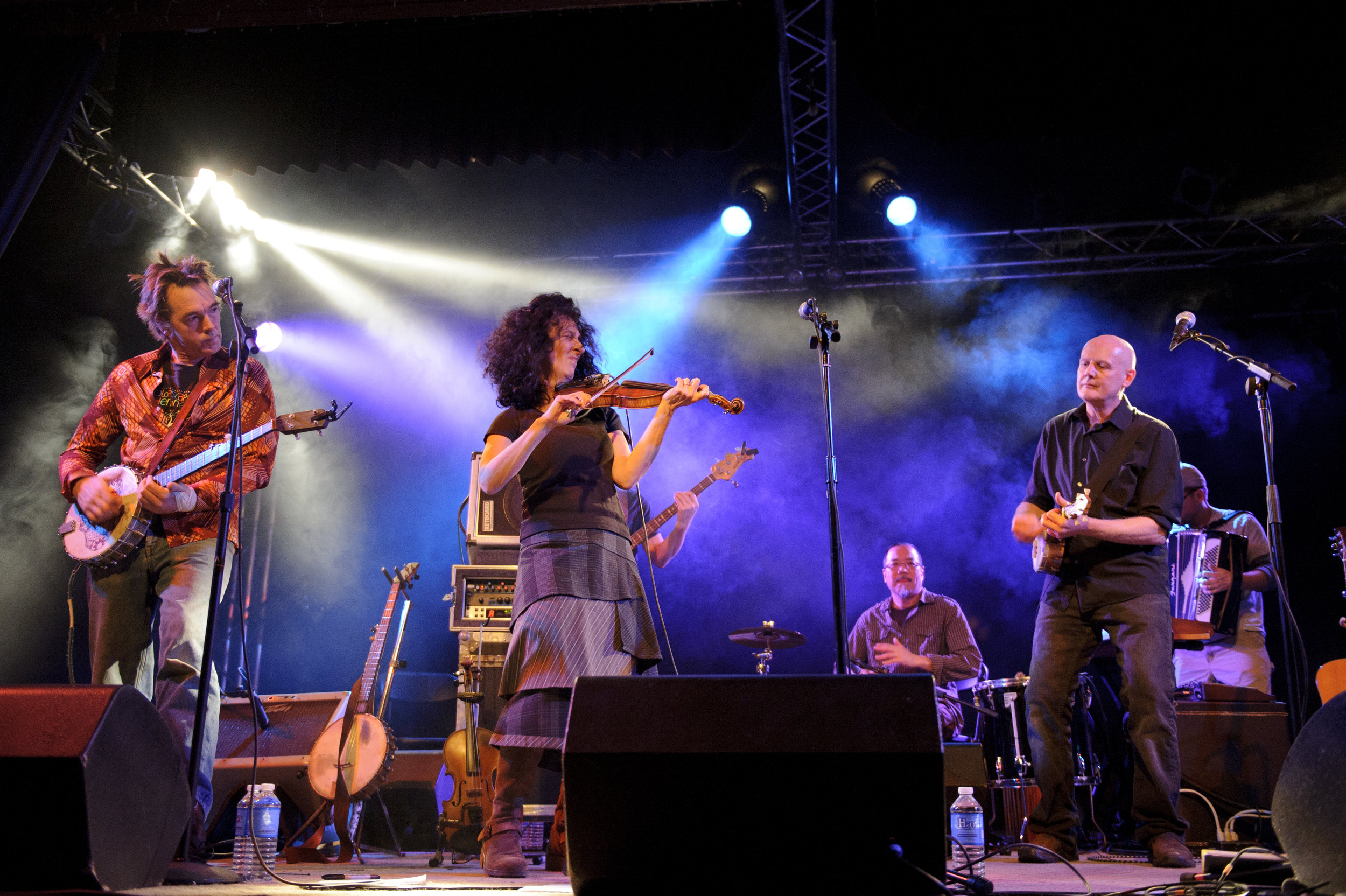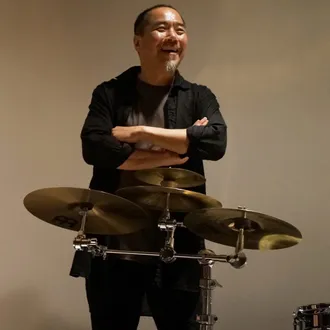
Percussionist and improvisor Takaaki (a.k.a., ‘Taki’) Masuko is an unconventional and versatile drummer with a passion for twisting time, banging on metal objects to hear their colors, and blending the old and borrowed with the bold and new. Masuko remains best known as the source of the “astonishing centrifugal force” and “breathtakingly complex rhythms” (The Cleveland Plain Dealer) that made Ithaca, NY’s alt rock-mountain-music unit The Horse Flies an internationally beloved cult band. His drive to discover what things, images, and feelings sound like has infused his musical voice with unique flavor.
Born in 1952, Taki soon disappointed his mother, a professional organist, who had fantasized he would become the bowing-half of a violin-piano duo with his sister. Though he dabbled in violin and danced to opera and ballet scores in the living room throughout childhood, then routinely snuck out of his boarding school dorm to drink coffee and smoke cigarettes in Tokyo jazz clubs as a teenager, Masuko didn’t consider making music professionally until Ginger Baker’s sound on Cream’s “Sunshine of Your Love” led him to take up drumming at 19.
He graduated from the Osaka University of the Arts, receiving its Distinguished Performer award, in 1978. While finishing university, Masuko freelanced with the Osaka Philharmonic Orchestra, and with the Kyoto and the Nagoya Philharmonic Orchestras, where he encountered the sonically-adventurous compositions of Krzysztof Penderecki and Harry Partch. Inspired to experiment, Masuko began improvising free-form compositions, mixing the vocabulary of contemporary orchestral percussion with what he was learning of Noh drumming from Master Takayoshi Hoshi.
He came to Boston from Japan in 1979 to explore improvisation using orchestral and world percussion in Gunther Schuller’s Third Stream Program at The New England Conservatory of Music. Increasingly interested in jazz and world music, Masuko added jazz legends to his list of influences, as well as countless unnamed musicians on recordings he studied of music from the AfroCuban, klezmer, Balkan, Brazilian, Venezuelan, Columbian, Irish, and Turkish traditions. Fascinated with hand drums, Masuko studied West African dance and drumming with ethnomusicologist David Locke, and Arabic music and percussion with Karim Mohammed.
Answering a knock on his NEC practice room door introduced Masuko not only to a modern dance student seeking a drummer, but also to a new means of exploring gesture, rhythm, and improvisation that would prove a key part of his career. Masuko’s facile groove and responsiveness to dancers have made him a much sought-after dance accompanist at colleges, such as Boston Conservatory, Boston University, Emerson College, and Harvard University, and for studio classes at The Boston Ballet, The Dance Complex, and Green Street Studios, among others.
 In 1986, while on a salsa gig at the Pinewoods Dance Camp, Masuko first jammed with the old-time string band foursome who would become his primary musical collaborators for over thirty years: The Horse Flies. After recording 1989’s Gravity Dance (MCA), a top-40 record on the Gavin and CMJ charts also nominated for a New York Award, Rolling Stone hailed The Horse Flies as “a band that’s earned a buzz” for their “swirling, addictive songs.” The Chicago Tribune called their distinctive sound “a melange of rock, folk, and minimalism” and The Village Voice deemed it “demented, post-modern mountain music.”
In 1986, while on a salsa gig at the Pinewoods Dance Camp, Masuko first jammed with the old-time string band foursome who would become his primary musical collaborators for over thirty years: The Horse Flies. After recording 1989’s Gravity Dance (MCA), a top-40 record on the Gavin and CMJ charts also nominated for a New York Award, Rolling Stone hailed The Horse Flies as “a band that’s earned a buzz” for their “swirling, addictive songs.” The Chicago Tribune called their distinctive sound “a melange of rock, folk, and minimalism” and The Village Voice deemed it “demented, post-modern mountain music.”
 Masuko toured and performed with The Horse Flies throughout the US, Canada, and Europe at clubs, theaters, festivals, and events. The Horse Flies also appeared on US television and radio programs, such as MTV News, MTV’s Week in Rock, NPR’s Prairie Home Companion, E-Town, and Mountain Stage. To date, The Flies have recorded three other commercially released albums with Masuko: the critically acclaimed Until the Ocean (2008, Pest Control), In the Dance Tent (2006, Live and Kicking), and Two Traditions (1999, Callin’ the Kettle Black).
Masuko toured and performed with The Horse Flies throughout the US, Canada, and Europe at clubs, theaters, festivals, and events. The Horse Flies also appeared on US television and radio programs, such as MTV News, MTV’s Week in Rock, NPR’s Prairie Home Companion, E-Town, and Mountain Stage. To date, The Flies have recorded three other commercially released albums with Masuko: the critically acclaimed Until the Ocean (2008, Pest Control), In the Dance Tent (2006, Live and Kicking), and Two Traditions (1999, Callin’ the Kettle Black).
Additionally, The Horse Flies sound attracted an array of dancers—including the Second Hand Dance Company, who frequently joined them on stage in the 1990s. Under the moniker The Second Hand Band, Masuko, along with cello-innovator Hank Roberts and fellow Flies Richie Stearns and Peter Dodge, improvised music for the company’s performances at NYC’s New Victory Theatre.
In 1989 he accepted an invitation to teach at The New England Conservatory, becoming a respected drum teacher. For twenty-six years, Masuko taught drums, percussion, and ensembles at the Longy School of Music and at other colleges and community music schools in the greater Boston area. While at Longy, Masuko’s work with celebrated Dalcroze teacher Lisa Parker led to relationships with music educators in Japan, for whom he routinely offers frame drum clinics and movement-and-music workshops.
 Masuko met early music vocalists Cristi Catt and Daniela Tosic as Longy graduate students, and has since performed, recorded, and toured with them in many ensembles.
Masuko met early music vocalists Cristi Catt and Daniela Tosic as Longy graduate students, and has since performed, recorded, and toured with them in many ensembles.
Masuko and his one-time NEC student, avant-garde pianist Satoko Fujji, and her experimental jazz trumpeter husband, Natsuki Tamura, remain frequent collaborators on performances and projects, such as: ! Hakidame ni Tsuru, their improv troupe with percussive dancer Mizuki Wildenhahn, ! Hada Hada Tamura’s 2003 album, and ! Senzai Ichigu, their upcoming free improv album with Johannes Ammon. .
Taki’s forty-plus year career crosses genres and encompasses solo work and numerous collaborations, recordings, and live performances across five continents with artists ranging from David Byrne and Les Miserable Brass Band, Satoko Fujii and Natusuki Tamura, Claire Ritter, Tapestry, Richie Stearns, the Zamir Chorale of Boston, Sabana Banca, and Telltale Crossing, among many others.
At this concert, Taki Masuko will perform in the world premiere of “Sarai” by Robbie Solomon, ad in works by George Gershwin and by Abraham Ellstein.
